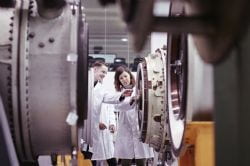University of Lincoln wins national commendation for connecting expertise with industry
27 July 2017
The University of Lincoln, UK, has won a national commendation for the way it connects academic expertise with the needs of industry and society. Lincoln was one of only eight universities across the country commended by the Higher Education Funding Council for England for its strategic approach to knowledge exchange. Knowledge exchange covers activities that […]

 The University of Lincoln, UK, has won a national commendation for the way it connects academic expertise with the needs of industry and society.
The University of Lincoln, UK, has won a national commendation for the way it connects academic expertise with the needs of industry and society.
Lincoln was one of only eight universities across the country commended by the Higher Education Funding Council for England for its strategic approach to knowledge exchange.
Knowledge exchange covers activities that link universities’ teaching and research with outside organisations, such as small businesses, local authorities or charities, in ways that benefit the economy or society.
This could include support for start-up companies and SMEs through business incubation, knowledge transfer partnerships (KTPs) that place highly-skilled graduates with organisations for fixed-term projects or the commercialisation of research discoveries in collaboration with industrial partners.
Organisations that receive Government funding through the Government’s Higher Education Innovation Fund (HEIF) were asked to submit five-year strategies to HEFCE. Other institutions to receive commendations included the University of Oxford, Imperial College and the Institute of Cancer Research.
Andrew Stevenson, Director of Research & Enterprise at the University of Lincoln, said: “We’re very proud to receive this commendation from HEFCE for our strategy to further engage with and support our industrial partners in the public, private and third sectors.
“Universities have a vital role as active anchor institutions not just in creating knowledge through their teaching and research, but in translating these innovations into new products, services and support that industry and ultimately consumers, can benefit from. At Lincoln this engagement has always been, and will continue to be, a partnership where knowledge and challenges flow both ways.
“This commendation for our knowledge exchange strategy once again shows that Lincoln is setting sector standards for how universities and industry can work together.”
Examples cited in the University of Lincoln’s report include the recent creation of new academic schools of engineering, chemistry, pharmacy and mathematics and physics to address regional skills gaps identified with employers, and the emergence of research specialisms in health and agri-food.
It also highlights work through the Greater Lincolnshire Local Enterprise Partnership to help key local industries innovate and improve productivity by providing access to funding, facilities and research capacity. For instance, the University’s Lincoln Institute for Agri-food Technology and National Centre for Food Manufacturing work with hundreds of organisations ranging from small family-run business to multi-national companies to design and deliver teaching and research that addresses industry challenges.
The University of Lincoln has previously won national accolades for its approach to working with industry, including a Lord Stafford Award and Times Higher Education Award and was cited in recent reports by Sir Andrew Witty and Sir Tim Wilson on university-industry collaboration.
